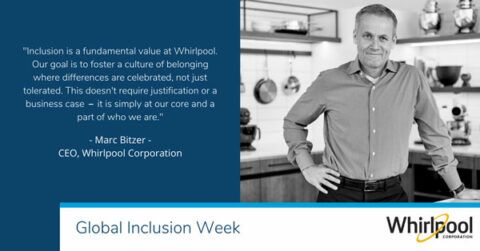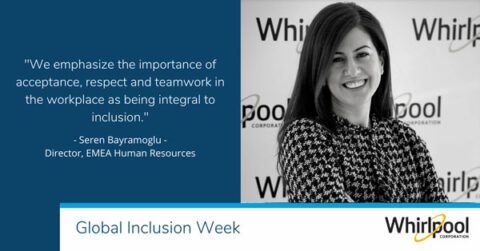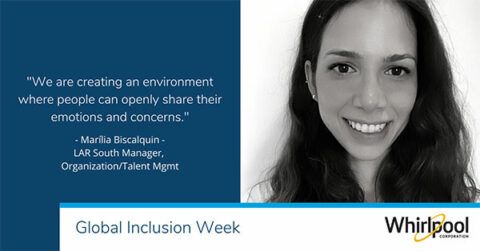Whirlpool Corporation Celebrates Inclusion and Diversity in Multiple Regions Around the World for Global Inclusion Week


North American Region (NAR)
 For the second year in a row, Whirlpool Corporation in North America celebrated Global Inclusion Week (GIW) with a variety of speakers and sessions designed to engage employees and teach them about the importance and benefits of Inclusion and Diversity in the workplace.
For the second year in a row, Whirlpool Corporation in North America celebrated Global Inclusion Week (GIW) with a variety of speakers and sessions designed to engage employees and teach them about the importance and benefits of Inclusion and Diversity in the workplace.
This year’s sessions included Jennifer Brown, author of “How to be an Inclusive Leader.” She is an award winning entrepreneur, speaker and diversity and inclusion consultant who kicked off GIW with a session about the personal and emotional journey every leader must undertake in order to create an inclusive workplace where everyone can thrive.
“Every last one of us knows what it feels like to be excluded,” said Brown. “We have all experienced it, albeit some of us more often and, perhaps, more intensely that others—and we all have a diversity story, even those who we might not expect.”
Andrea Caldwell, a senior consultant from Franklin Covey presented “Six ways to help your organization be more inclusive.” In her presentation, she shared several strategies for how employees can contribute to a more inclusive organization, starting with an understanding of unconscious bias and how it weakens a culture of inclusion.
She presented examples of unconscious bias and shared tips for overcoming it so we don’t miss an employee’s potential. “Model fairness and inclusivity in your own behavior,” said Caldwell. “When you make sure colleagues are welcomed, respected, heard and valued, the impact of that behavior is beneficial to their performance.”
Every day, with every effort we strive to welcome, hear, respect, and value everyone. Our strength at Whirlpool Corporation is in our differences. Inclusion and Diversity is a core value at Whirlpool Corporation, because we know that drawing from diverse points of view improves our products, services, teams and each other. Yet, we recognize we are on an ongoing journey, and we are committed to new, bold goals and meaningful action to cultivate an even stronger inclusive and diverse workplace, as well as in the communities where we work and live. Inclusion creates a culture of belonging; diversity makes us better.
Europe, Middle East and Africa Region (EMEA)
 EMEA has set a goal of increasing female diversity at the leadership level. A key initiative in this direction has been a Leadership Development Program for its women in the region, called EMPOWER. The program is designed to encourage women who demonstrate great leadership potential to explore the wide range of leadership opportunities available to them.
EMEA has set a goal of increasing female diversity at the leadership level. A key initiative in this direction has been a Leadership Development Program for its women in the region, called EMPOWER. The program is designed to encourage women who demonstrate great leadership potential to explore the wide range of leadership opportunities available to them.
“We train and develop them through the 7-month journey, and enrich our future leadership pipeline at the same time,” said Seren Bayramoglu, EMEA Human Resources director.“ A successful example of EMPOWER is Simona Gianotti, who was recently promoted as the CIO for EMEA.”
They understand that diversity is about more than just gender, however. “Over the past few years we have provided a number of training and learning tools for all employees to understand unconscious biases and to develop more inclusive behavior,” explained Bayramoglu. “We have also applied our lessons from I&D to reshape and accelerate our approach to how we look at talent and nurture them. More importantly, through internal communication channels and leadership commitment, we constantly emphasize the importance of acceptance, respect and teamwork in the workplace as being integral to inclusion.”
Considering the changing landscape of the corporate world given the pandemic this year, Bayramoglu believes that inclusive leadership can truly help engage today’s disrupted, virtual workforce.
“We need leaders that can seek out and value individual perspectives, create a sense of belonging among virtual teams, engage people effectively in a tough context, across physical distance and video screens. Inclusive leaders will be able to demonstrate compassion, kindness, and curiosity. I also believe that such an inclusive culture can be a powerful driver of resilience.”
In EMEA, they are committed to having an organization that closely represents the diversity and richness of the consumers in EMEA.
“An ongoing strategy for the region will be to continue to amplify our culture of inclusion, expanding beyond our yearly inclusion week celebration or occasional inclusion training to empower our people to start having meaningful, open and transparent dialogue on equality, on a daily basis.”
Latin American Region South (LAR South)
 In Whirlpool Corporation’s LAR South region, the team has been working in close collaboration with Employee Resource Groups (ERGs) to leverage Inclusion and Diversity, specifically about gender within their Women’s Network, LGBTI+ (called Pride) and Race/Ethnicity groups (known as FOCUS). I&D efforts in LAR started more than a decade ago and has helped position Whirlpool as one as one of the top five companies in I&D in the Top of Mind HR 2020 list in Brazil.
In Whirlpool Corporation’s LAR South region, the team has been working in close collaboration with Employee Resource Groups (ERGs) to leverage Inclusion and Diversity, specifically about gender within their Women’s Network, LGBTI+ (called Pride) and Race/Ethnicity groups (known as FOCUS). I&D efforts in LAR started more than a decade ago and has helped position Whirlpool as one as one of the top five companies in I&D in the Top of Mind HR 2020 list in Brazil.
“We’re bringing awareness about I&D through employee communications and webinars,” said Marília Biscalquin, who leads the Center of Excellence for Talent Management in the region. “The main focuses this year have been bringing men into gender discussions, creating ‘ally networks,’ supporting women during the pandemic, training and embedding Pride ERG members, expanding inclusive benefits for employees—such as Lactation Rooms and Pregnancy Guides in Argentina—and instituting a new set of Disability Protocols.”
The team has also been following a five-point action plan focusing on bringing more diversity in its talent acquisition processes, empowering senior leaders with I&D as part of their goals, promoting leadership discussions about I&D, and the launch of a Regional Council concerning inclusion and diversity.
“The pandemic called our attention to how we still have a long way to go as a society in terms of I&D, sometimes highlighting the vulnerability of minorities; which also reflects the world inside our company,” said Biscalquin. “We have to create an environment where people can openly share their emotions and concerns.”








